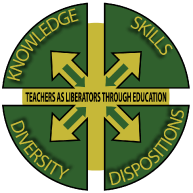Conceptual Framework
The Conceptual Framework- “Teachers as Liberators through Education”
Kentucky State University’s mission provides for a multicultural, challenging, student- centered learning environment that prepares its students for responsible participation and leadership in the Commonwealth of Kentucky and the global community. The School of Education (SOE) educator preparation conceptual framework is consistent with this mission and was developed to describe its vision and purpose in preparing educators to work in P-12 schools. The focus of the conceptual framework is to prepare educators who are reflective practitioners, culturally responsive, effective facilitators, critical thinkers, and proficient technology users who are capable of meeting the diverse needs of all learners. Supported by a strong knowledge base, the conceptual framework provides a system for ensuring a coherent and well-articulated professional commitment to student knowledge of content, teaching competence (skills), dispositions, and diversity. This is reflected in the curriculum, instruction, and clinical experiences provided to develop the knowledge, skills, and dispositions that are valued in educators. The conceptual framework provides the direction for programs, courses, candidate performance, scholarships, service, and unit accountability. Coherence exists among the conceptual framework, courses, early field experiences, student teaching, practical, and learner outcomes–what our teacher candidates and graduate candidates know and are able to do.
The evolution of the current conceptual framework connects collective experiences to the emerging knowledge base in the field of education and leadership. Then, this experience and knowledge correlates with the reality of the work of P-12 public school settings. Features of this framework are:
- It is in direct alignment with the School of Education’s mission statement and congruent with the mission statement of the Kentucky State University.
- Preparation programs directly connect with the learning of P-12 students and to the state/national accountability standards that have evolved over the past 25 years and especially since the adoption of the Kentucky Common Core Academic Standards.
- The faculty reviewed and accepted the Kentucky Teacher Code of Ethics and Kentucky Teacher Character and Fitness Form for Educators. This code serves to guide the program in developing and monitoring candidates’ professional dispositions.
The unit’s conceptual framework identifies the variables and relationships that describe schools as social systems. One objective of the teacher education program is to ensure that our candidates understand these relationships and can use this knowledge to make wise decisions regarding areas such as reform of school curricula and selection and retention of highly qualified personnel. A schema illustrating the conceptual framework follows:
Figure I: Conceptual Framework Model “Teachers as Liberators through Education”

The model reflects the principles of Dewey, Friere, and Bandura that education facilitates social change and self-efficacy, that education is one of the essential tools that give persons the opportunity to better themselves, and is a constant process for the liberation of human beings.
Area One, the circle, includes the learning community that has joined in partnership to develop the “Teacher as Liberator through Education. These stakeholders believe in accountability, quality assurance, collaboration, diversity, and equity.
Area Two, the intersecting arrows, includes the four descriptors of the educator who is a liberator. These four descriptors are paramount throughout preparation and as such are the outcomes expected of the Teacher as Liberator through Education. The knowledge, dispositions, and skills (see Figure 1) are delineated for one who is a pedagogically knowledgeable in content, an advocator of diversity, skillful in facilitation of instruction, and possesses appropriate dispositions. These essential characteristics in the institutional standards are assessed both formally and informally and are aligned with NCATE, Kentucky Teacher Standards, EPSB Themes, Kentucky Core Academic Standards, and Specialty Professional Areas standards.
Area Three, inner arrows pointing toward center, shows the major components that encompass the knowledge and skill requirements of candidates at the initial and advanced levels of Professional Knowledge, Pedagogical Knowledge, Content Knowledge and Diversity. One of the most important determinants of student achievement is teacher expertise; skilled teachers are the most critical of all schooling inputs. At the initial level, the unit seeks to produce skilled educators who demonstrate a potential for developing the expertise needed for high student achievement.
